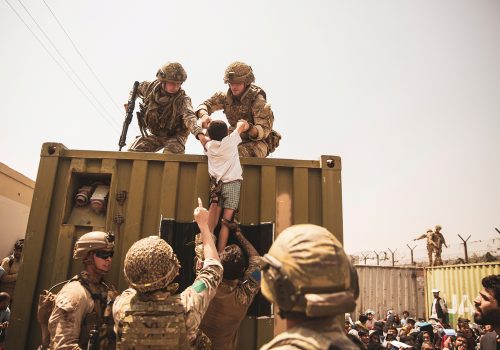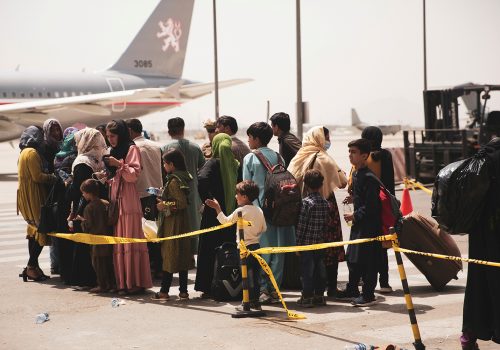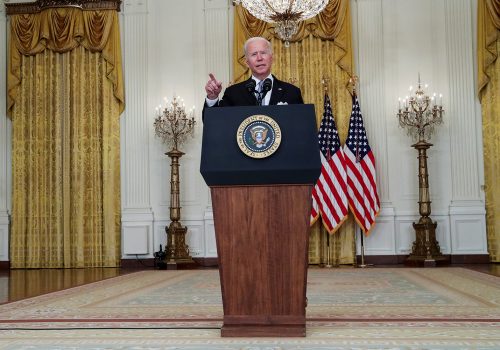FAST THINKING: The clock is ticking in Afghanistan
JUST IN
Deadlines have consequences. Bucking increasing domestic and international pressure, US President Joe Biden is sticking to his August 31 timeline for withdrawing all American troops from Afghanistan. Meanwhile Taliban leaders are threatening force if Biden extends his deadline, while blocking Afghans from leaving the country in the ongoing airlift that’s evacuated more than 80,000 people since August 14. How will the coming days play out? What remaining leverage does the West have with the Taliban? Our experts answered the call.
TODAY’S EXPERT REACTION COURTESY OF
- Kirsten Fontenrose: Director of the Scowcroft Middle East Security Initiative and former US National Security Council senior director
- Leah Scheunemann: Deputy director of the Transatlantic Security Initiative and former Pentagon official focused on international security policy
- Julia Friedlander: C. Boyden Gray senior fellow, deputy director of the GeoEconomics Center, and former US National Security Council director
Deadline dash
- On Tuesday, CIA Director William Burns met with the Taliban’s de facto leader, Abdul Ghani Baradar. Kirsten imagines the message from Baradar was something like: “You can save the lives of US soldiers or you can save the lives of Afghans.”
- If the US military remains in the country into September and is attacked by the Taliban, Biden would be forced to respond and get sucked back into the very Afghan quagmire he’s seeking to escape, Kirsten predicts. That’s why he’s resisting any extensions. “The risk of breaking a campaign promise must seem politically untenable to the president,” she says.
- Reading between the lines of Pentagon statements that pointedly attribute the US withdrawal timelines to Biden himself, Leah says the framing “makes it clear to me that the military leadership is advising a different course of action.” But the deadline stands, with reports indicating the civilian airlift could end as soon as this week.
Subscribe to Fast Thinking email alerts
Sign up to receive rapid insight in your inbox from Atlantic Council experts on global events as they unfold.

Stronger with allies?
- Frustrated by a lack of consultation on the US withdrawal, European allies have sought to convince Biden to push back his deadline. As Leah points out, that’s because “there is little Europeans can do on their own. Their own militaries alone lack the necessary capabilities to effectively evacuate Afghans, and they have always relied on US” airlift capacities, medical evacuations, and intelligence assets.
- What can they do? UK Prime Minister Boris Johnson emerged from an emergency meeting of the Group of Seven (G7) nations on Tuesday vowing that the economic heavyweights would use their “leverage” to pressure the Taliban into better behavior. But Julia is less enthusiastic. Although the United States and its allies should exhaust financial and economic tools to sever the Taliban’s resources, western countries tend to “overestimate [their] leverage through official means,” she tells us, “and underestimate the ability of non-state or semi-state actors to sustain themselves.”
- Groups like the Taliban are able to self-finance “through established cross-border flows, patronage networks, and local protection money that have zippo to do with international financial institutions,” Julia adds.
- Another source of Taliban cash: kidnappings. Which is why, to Kirsten, the Taliban’s expressed concerns about a “brain drain” from departing doctors and engineers ring hollow as justification for blocking departures from Afghanistan. She notes that “the Haqqani Network is now the security service of Kabul. Their favorite tactic is kidnapping for ransom. Afghans who worked for US or international NGOs and companies will look like blank checks.”
“Underground railroad”
- What will rescue efforts look like after Tuesday? Getting Afghans out without using the US military. “This could take the form of an Underground Railroad to Pakistan, Tajikistan, Uzbekistan, Turkmenistan, where leaders would undoubtedly need to be ‘incentivized’ for their facilitation,” Kirsten tells us. Foreign embassies in Afghanistan could reach an agreement “to take in asylum-seekers for one another and shepherd them out of the country,” she suggests.
- There’s also an opportunity, Kirsten says, for the US government to strike a deal with the Taliban to let members of Afghan civil society leave. “These are the people least amenable to the Taliban’s vision for the country, potential troublemakers” in the Taliban’s view, she notes in explaining the case that US officials could make to Afghanistan’s new rulers. “Best to have them depart. The Taliban habit of murdering them does not comport with the revised image of the movement the leadership is trying to sell to the world.” And they pose little threat outside the country, where they “will seek quiet, peaceful lives abroad with a hope of prosperity for their children,” she says.
- In the coming days, Kirsten adds, the Biden administration should do more to recognize and help the non-governmental volunteers who have been working around the clock and paying out of their own pockets for evacuation efforts: “The Afghan families wading through the moat of sewage outside an airport gate to meet up with a Marine inside the wire who received the photo of their ID from a buddy who served with them will tell the stories of the Signal groups and the friends of friends who saved them.”
Further reading
Mon, Aug 23, 2021
David Petraeus: ‘The Taliban are about to be acquainted with a very harsh reality—that they are broke’
New Atlanticist By
General David Petraeus told the Atlantic Council that it is time to recognize a new reality and to move forward after Afghanistan. But, he says, the United States still has an opportunity to influence the Taliban.
Fri, Aug 20, 2021
FAST THINKING: Will the Kabul airlift succeed?
Fast Thinking By
How is this effort playing out? Where are Afghans going? What could go wrong? Our experts are here to get you ahead of this fast-moving story.
Thu, Aug 19, 2021
What Washington owes the American people after its Afghanistan failure
New Atlanticist By Christopher Preble
The discussion about what the United States should do in the aftermath of its war in Afghanistan should proceed in three phases: now, soon, and soon thereafter.
Image: A US Marine with the Special Purpose Marine Air-Ground Task Force-Crisis Response-Central Command escorts a child to his family during an evacuation at Hamid Karzai International Airport in Kabul, Afghanistan on August 24, 2021. Photo via Sgt. Samuel Ruiz/US Marine Corps/Reuters.


